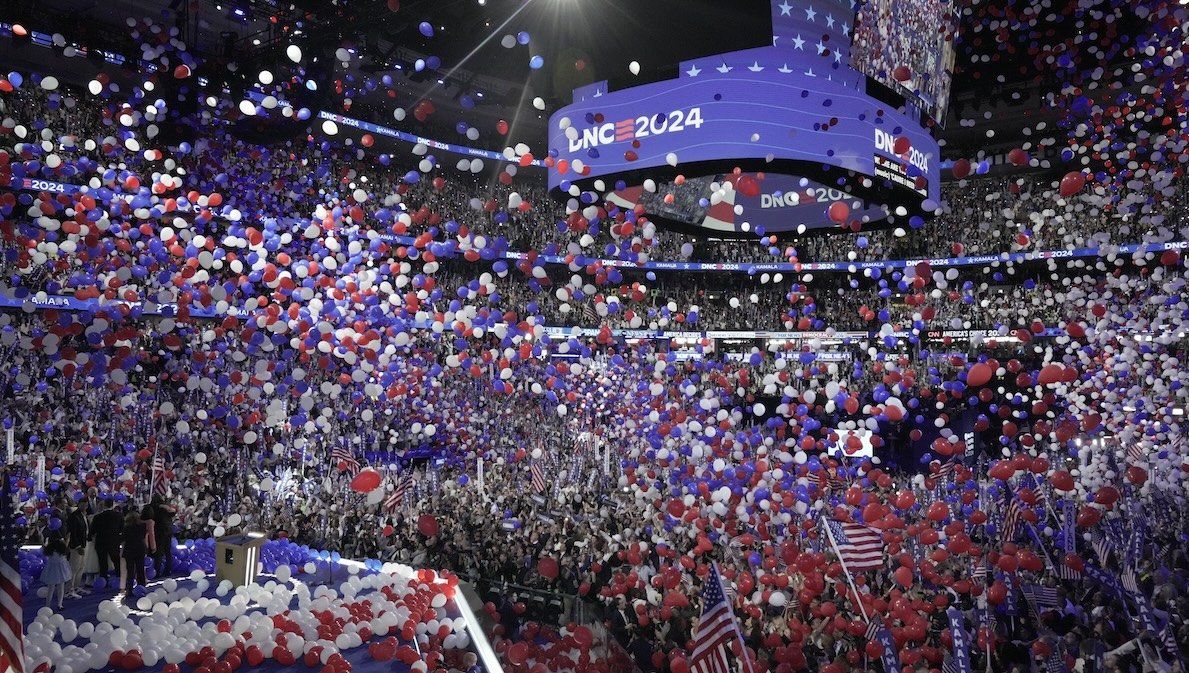August 23, 2024
Well, the Democratic National Convention is over, and as rebrands go, this was a turnaround the likes of which we haven’t seen since, say, Birkenstock went from hideous hippy sandal to high fashion icon.
Remember, barely a month ago this was a party in trouble. It was trailing in the polls, led by a visibly diminished president, and at war with itself about what to do about both of those things. The vibe was worse than hopeless; it was listless. Like, early 1990’s Apple hopeless and listless.
So much for all that. Over the past week, the Democrats reinjected a sense of energy and optimism into a party that was not long ago getting shelled with “Weekend at Bernie’s” jokes.
In doing so, they achieved three important things:
1. They passed the torch
Not just from Joe Biden to Kamala Harris but to a younger generation of Democrats altogether. I mean, whatever your view on Bill Clinton — mixed feelings over his legacy were reflected in the response to his speech – it was a moment for him to head off into history with a speech to a party that welcomed him 30 years ago as the face of the future.
2. They unified around a decent and reasonably positive message
They took shots at Donald Trump and his agenda for sure (Harris might have spent too much time on this in her speech), but the story felt less like “vote for us or else X” and more like “vote for us because of Y.”
The Democrats told a nice story about a progressive, inclusive future America, where middle-class people have nice places to live, well-fed kids don’t get shot at school, and where women are free to choose what they do with their own bodies.
3. But, mostly, they showed something they didn’t seem to have a month ago: energy
The convention, in the end, was a party for a party that needed it.
To be fair, not everything was great. Some of the speakers were duds, not all the jokes landed, and the programming ran late – Democrats appear to have adopted California’s idea of “prime time” in honor of their nominee. And there were, of course, maggots in the breakfast buffet. But these are nitpicks.
The bigger question is: What happens now? The landscape for Democrats outside of Chicago’s United Center is still a sobering one. Polls show Harris in a statistical dead heat with Donald Trump.
RFK Jr., the strongest third-party US presidential candidate in 30 years, is about to bow out of the race and pledge his support to Trump, which could give the ex-president the decisive few extra points worth of voters he’ll need.
In the end, branding and rebranding have their limits. A political party, and a presidential candidate, have to do more than sell sandals. They have to – in the words of Michelle Obama, Oprah Winfrey, and Harris herself – “Do something! Do something! Do something!”
Now that the party’s over, Harris and the Democrats have just 70 days to show what they are going to do – and how.
More For You
Most Popular
With the US leading production and China driving new reactor development, Bank of America breaks down the who, what, where, when, and why behind nuclear’s return. Stay ahead of global energy trends with Bank of America Institute.
Chris, an Army veteran, started his Walmart journey over 25 years ago as an hourly associate. Today, he manages a Distribution Center and serves as a mentor, helping others navigate their own paths to success. At Walmart, associates have the opportunity to take advantage of the pathways, perks, and pay that come with the job — with or without a college degree. In fact, more than 75% of Walmart management started as hourly associates. Learn more about how over 130,000 associates were promoted into roles of greater responsibility and higher pay in FY25.
Last week, at the Munich Security Conference, a group of global technology providers, including Microsoft, announced the Trusted Tech Alliance — committed to shared, verifiable principles for trusted, transparent, and resilient technology across borders. At a moment of economic volatility and zero-sum technological competition, countries and customers are demanding greater accountability from technology providers. The Alliance addresses this by bringing together companies from across Africa, Asia, Europe, and North America around shared commitments: transparent governance, secure development practices, supply chain oversight, open digital ecosystem, and respect for the rule of law — ensuring the benefits of emerging technologies strengthen public trust while driving job creation and economic growth. Explore the Trusted Tech Alliance here.
© 2025 GZERO Media. All Rights Reserved | A Eurasia Group media company.
